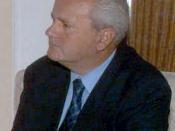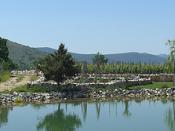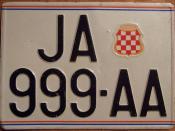Slobodan Milosevic
After World War II, the communist leader Marshal Josip Broz Tito took control of the Austro-Hungary government, and declared a new federal Republic on November 29th, 1945 named Yugoslavia. This Republic was joined by Slovenia, Croatia, Bosnia, Macedonia, Serbia and Montenegro. When Tito died on May 4th, 1980; the tension started to rise among the states mentioned above, at the same time someone started to raise power, his name was Slobodan Milosevic. He was born on August 20th, 1941 in Pozerevac, a small town in Yugoslavia, about 60 Km. southeast of capital city Belgrade. Milosevic was the second son in his family, and former son of Orthodox priest from Montenegro and a Serbian communist School mistress. His both parents committed suicide; his father killed himself in 1962 and his Mom did the same in 1973. Also, his uncle committed suicide. It seems he met his future wife, Marijana Markovic, when attending High School.
In 1959, he joined the Communist party while studying in the University of Belgrade. During University his classmates started calling him "Little Lenin", when he was the Head of Ideology of Communist Party Branch. When he left University in 1964, he became one of the Economic advisors to the Mayor of Belgrade. After five years, then he married Marijana Markovic. Mrs. Markovic would also have the same political influence in his life because she was also involved in the Communist party. In 1968, he started his career in Business Administration, becoming the head of so called Techogas, one of the state owned gas companies. In 1978, Milosevic became the President of Beobanka, the United Bank of Belgrade, where is worked until 1983. He also traveled many times to Paris and New York. He also learnt English which would help him in his future career.
In April, 1986; Milosevic was elected as the chairman of Belgrade city committee of the League of communist, replacing Stambolic, who moved as Head of Communist Party. Milosevic wanted Marxism as subject in schools, so that way he would be more supported by young people. In 1987, Milosevic became an important force in the Yugoslavian politics. The same year he responded to protestors who complained about being beaten by police; then he said "you will not be beaten". For Stambolic, it meant the last day for the real Yugoslavia. Stambolic, as new President supported new communist party leaders. Stambolic spent many days giving Malosevic advices and made sure he would manage his party leadership. This advice would be the biggest mistake he made in his political career, which he would regret for the rest of his life. Later, Malosevic would topple him in the 8th session of the Yugoslavian communist party.
Dragisa Pavlovic was one of the allies to Stambolic, he also was the head of the Belgrade committee of the party, and he opposed Milosevic policies toward Kosovar Serbs. Behind Stambolic back, Milosevic started quietly replacing Stambolic supporters with his own people. On September 23rd and 24th, 1986 on the Communist central committee broadcast live and TV, Milosevic overthrow Pavlovic. After a couple of days under pressure of Milosevic supporters, Stambolic resigned after Pavlovic. Later in the same month Milosevic took Stambolic power, and became new president of Yugoslavia. In the summer of 2000, Stambolic was kidnapped, and his body found in 2003. After one year, Milosevic was charged, unfortunately he had enough power to avoid going to prison.
Some of his secret police and some criminal gangs were charged for many murders of political leaders including Stambolic. In 1988 and 1989 Milosevic spent a lot of his time focusing his politics on "Kosovo Problem". He supported many organized demonstrations in Kosovo because many Kosovar Muslims started to rise. Azem Villasi, leader of Kosovar Albanian communist party was arrested because they were falsely charged by Malosevic. He started eliminating leaders from the minority who standed on his path. In 1989, the National Assembly of Yugoslavia under Milosevic regime came with its new plan. He wanted to reduce two provinces, Kosovo and Vojvodina, and combine them in one, so it could belong to Yugoslavia. Kosovar opposed his new plans which caused raising alarm in other States and Provinces in Yugoslavia. Later, during that year Milosevic secured that Republic's vote for himself what was called Montenegro. His presidency was divided between Molosevic supporters and opponents in the other republics with four votes for each side.
This would increase and paralyzed the Yugoslavian government. In January 1990 at the 14th congress of the league of communist, Milosevic campaigned for Major constitutional change, and this campaign would give him more political power than before. Slovenian and Croatian delegations opposed these changes lead by Milan Kucan and Ivica Racan. They felt it was an attack on their own republics, and Yugoslavian Congress started its protest. This protest caused League of Communist party to come to its end. After the party collapsed, Milosevic adopted new Constitution on September 1990 giving direct election of a President with increased powers. On December 1990 and same month in 1992, Milosevic tried his new power from direct elections.
In December 1990, Milosevic party won the 80.5 % of the votes. It seems most of the Albanians in Kosovo boycotted; even the boycott did not affect him. Milosevic took control of Media and election system itself, so the Media could make up how he won the elections to citizens. If someone would complain from political issues, he or she would be eliminated or taken apart from power. Nationalism started growing up in all former Yugoslavian republics. In 1990, Slovenian elected their nationalism government under Millan Kucan direction. Croatians did the same thing electing Franjo Tudman. Communist in Bosnia and Herzegovina elected its own party with three ethnical parties. Tension between republics of Yugoslavia broke out. In 1991, Slovenia and Croatia suddenly broke apart from Yugoslavia. The same year Macedonia got its own Independence. In March of 1992, Bosnia and Herzegovina had its turn to be independent.
Milosevic tried everything in his power to keep all republics together. For this reason he called a meeting in Slovenian capital Ljubljana and the meeting was supposed to be called the "Meeting of Truth" to discuss about Kosovo situation but Kucan rejected to participate in such meeting. Kucan, later told his Slovenian people that Milosevic said to him "We should reach some kind of agreement on Slovenian desire to leave Yugoslavia"; Kucan just answered he would not stop Slovenians to separate from Yugoslavia. Milosevic also told kucan that he could not let Croatia make its own Independence.
Later, in middle 1990's Croatian Serbs started campaign for Independence from Croatia after the Nationalist election of Franjo Tudman, with full support form Slobodan Milosevic. Suddenly, the war broke out in Slovenia and only last ten days. Milosevic did not have enough political supporters and Slovenia finally got its Independence. The new Croatian elected Nationalist Franjo Tudman and Milosevic had secret meetings about Bosnia, they wanted to split Bosnia in two parts; one part was supposed to belong to Croatia and the other to Yugoslavia or New Serbia. Soon their relationship broke out so that in 1991 Croatia started expelling minority Serbs groups; in the same way Milosevic started attacking back Croatian cities. In middle 1991, Croatia finally made its Independence, even still fighting with Milosevic. The same year, Macedonia got its Independence facing little resistance from Yugoslavia.
Bosnia and Herzegovina made its own announcement for getting Independence from Yugoslavia. Milosevic was sure he would not loose Bosnia easily, so he started supporting Serbs in Bosnia, politically and military. He started sending more weapons; as a result Bosnian Serbs captured 70% of the country, and expelling hundreds of thousands of non-Serbs such us Bosnian Muslims and Catholics; in addition to killing thousands of its own citizens. It is estimated that 20,000 Muslim women and young girls were thrown in rape camps. Others were held as hostages, many more ended up in refugee's camps while others were held hostages to be used as prisoners for exchange.
Bosnia capital, Sarajevo was under siege with Milosevic army; they bombed the city 24/7 and many more snipers were also caused of dead. In middle 1993, Croatian army took some of Bosnian territory, but they were resisted by Bosnian-Muslims. Later in 1994, Bosnian Muslims and Croatian military joined together to drive out Milosevic army from and around Bosnia. After one year Nuto launches its own air strikes against Milosevic army around the hills of Sarajevo. Bosnian-Croatian army expelled all Milosevic army from western Bosnia. In East Bosnia Milosevic army caught one small town called Srebrenica. This town was under UN zone called "safe zone".
In July 1995, Milosevic army took over control from U.N.; it is estimated there were about 40,000 Muslim civilians in Srebrenica. U.N. simply gave up and about 5,000 to 8,000 people were executed, especially males. Women were raped and children of age 13 or above were also executed. Meanwhile, Sarajevo lost 10,000 of its citizens including 1,500 children. On November 21st, 1995 Bosnia president, Milosevic and Franjo Tudam made peace according to the Dayton agreement. Milosevic, then turn his back to its own Bosnia Serbs and closed the Bosnian border.
Bosnia war cost up to 200,000 lives; about three million civilians were driven out from their homes and thousands were missing. In 1996 Milosevic criticism started growing more. Still under his power Yugoslavia is still faced with international pressure. In 1999 Milosevic refuse to sign a peace deal with Kosovo. Suddenly he decided to attack Kosovo province. In response NATO started bombing Yugoslavia for 78 days and facing wide spread criticism from USA and European Nations he finally is decided to withdraw from Kosovo province. As result 10,000 Kosovo-Albanians have died and 70,000 families are displayed from their homes.
In 2000 Milosevic is faced with mass demonstrations organized by student organization and by general strike led by coal miners. Many of protesters were hurt, but still they were not stopped by police. Police blocked the Milosevic parliament, but the fence could not stand the massive demonstrations. Than the crowd breaks into building, and than the civilians took control of the building. Once the crowd got into the building they started breaking everything inside the building. Faced pressure by his own people Slobodan Milosevic finally stepped down from his power. Than in October 7th 2000 Kostunica became first Democratic President of Yugoslavia-Serbia. In 2001 Milosevic is arrested by Serb government for abuse of power and corruption. Slobodan is also charged for smuggling gold out of country, and ordering assassination against those who stepped on his way.
It took Serb government only two months to transfer him at International court called Hague in Netherlands. Milosevic was charged with murder of Kosovo-Albanians, also charged by committing one of the worst mass genocide in Bosnia after World War II. He was also charged for being against Croatian people. Milosevic had two rooms in Hague; one where he used to sleep and the other one used as an "office". In this so called office he used to receive visitors. He had fax machine, phone, printer and computer, but he was not allowed to have internet. All of his crime was a life sentence, for him there was no death penalty. Later, between 2002 and 2003 doctors discovered that Milosevic had very high blood pressure and heart conditions.
His trial went on, but sometimes the trial had to be canceled because he would be ill. During his trial some of the former Republics apologized to each other. For example, Serbia-Montenegro and Croatia apologized on September 10, 2003. Milosevic denied everything so he just could protect himself. He had secret police and he used to send them to Bosnia; still he denied everything and blamed on US, Europe commission and Britain. Dictators are either supported by other leaders and sometimes by their own people. U.N. mentioned that genocide would not be repeated anywhere in the world after World War II. Today, genocide is happening somewhere in the world but many rich nations are ignoring it. Also, Media plays a huge role in our society because the Media sometimes does not cover what is happening in other countries.
Sometimes rich nations react really slowly to genocide and sometimes they do not even admit that this horrible crime is taking place somewhere, for example, Uganda and Bosnia. UN, USA and European countries did not do anything to stop massive genocide in Uganda. Maybe they thought Uganda's people were not enough important or maybe the country did not have enough natural resources to be worth it to stop genocide. The rule for rich countries is, if you have enough to return then you can have humanitarian aid, loans, guns and bombs. Many Uganda citizens have been murdered, and now after many years politicians are making some kind of excuse about what could be done. This same case had happened in Balkans; Milosevic came to power by eliminating his closest allies, that way he could become more powerful.
While Milosevic started killing ethnic Albanians, Croatians and Bosnians; many powerful countries just ignored those events. Many other countries would say that all that killing is outside their borders so not a nation issue because each country has independence to do their own rules. Sometimes, many countries can react after many killing and death, but too late for those innocents. I do not understand how in this 21st century, still dictators can become to power. My country Bosnia has lost 200,000 of its civilians, many part of my family, and much more were displayed from their homes and not less become refugees like my family and I. In capital city Sarajevo there have been 1,500 children died while world watched and ignored. I believe Milosevic was not powerful than other countries, and there should not be any excuse from rich countries that they could not do anything to stop genocide. The worst massacre happened in small town called Srebrenica, and it was the worst genocide in Europe after WWII. Thousands of civilians have been murdered by Milosevic army in front of blue helmets or so called U.N. Males and young kids were murdered, so there would not be any future, and enemy thought there won't be any future for Bosnians and town could slowly die. My own people have been murder just because we are Muslims. Also, before genocide happened in Srebrenica many civilians believed to Dutch army, but it turned out hey just let Milosevic army into town to kill civilians. Many have been murdered in front of Dutch army. They didn't do anything to stop killing, but they were focusing how to make excuse for not being protective for Bosnians. Many of its Milosevic army were giving candies to Bosnian children in front cameras. Once the media has left, than the genocide started occurring in front of Dutch army. Today it is the same case in Sudan. Many countries admit that genocide is taking place, but they don't do anything to stop. Media does not report what is happening in Sudan. I think if Sudan has valuable resources such as black gold than many countries would react to Sudan situation. Sudan is not rich in its natural resources and other countries don't even bother to help to Sudan. I think Sudanese, Bosnian, Uganda, Croatians and Albanians have many things in common. Their citizens have suffered many same things just because they have different religion, different colors or culture. It does not matter how far countries are from each other, but many times they share common things between each other. Powerful nations and U.N. should introduce a bill that states if one country commits crime against another than they should pay financially for extended period of time. In 2005 Bosnia has brought Serbia to International court against crime committed to Bosnian people and brought destruction of economy. Also, we need to teach ourselves and our children not to be selfish, but rather to learn how to share resources together as one world.
�PAGE � �PAGE �1�


